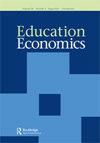撒哈拉以南非洲的学术成就:背景、同行和不平等
IF 0.9
Q3 Social Sciences
引用次数: 0
摘要
摘要本文以参加2014年PASEC评估的10个国家的26602名学生为样本,提供了撒哈拉以南非洲学生成绩决定因素的实证证据。通过使用两级层次线性模型,我发现学习不平等主要是由学校特征的差异来解释的。此外,评估结果证实了这一结果,显示了学校层面资源的相关性,以及它如何影响学生的表现,这取决于学校类型和地点。此外,我的研究结果显示,性别差异和同伴效应与社会经济地位有关,这对来自弱势背景的儿童产生了不成比例的影响。本文章由计算机程序翻译,如有差异,请以英文原文为准。
Academic achievements in Sub-Saharan Africa: contexts, peers and inequalities
ABSTRACT This paper provides empirical evidence on students’ achievements determinants in Sub-Saharan Africa based on a sample of 26602 students from the ten countries that participated in the PASEC 2014 assessment. By using a two-level hierarchical linear model, I find that learning inequalities are primarily explained by differences in schools’ characteristics. Furthermore, the estimation findings corroborate this result by showing the relevance of resources at the school level and how it affects students’ performances depending on school type and location. Additionally, my results showed gender disparities and peer effects related to socioeconomic status, which disproportionately influence children from disadvantaged backgrounds.
求助全文
通过发布文献求助,成功后即可免费获取论文全文。
去求助
来源期刊

Education Economics
EDUCATION & EDUCATIONAL RESEARCH-
CiteScore
2.00
自引率
8.30%
发文量
38
期刊介绍:
Education Economics is a peer-reviewed journal serving as a forum for debate in all areas of the economics and management of education. Particular emphasis is given to the "quantitative" aspects of educational management which involve numerate disciplines such as economics and operational research. The content is of international appeal and is not limited to material of a technical nature. Applied work with clear policy implications is especially encouraged. Readership of the journal includes academics in the field of education, economics and management; civil servants and local government officials responsible for education and manpower planning; educational managers at the level of the individual school or college.
 求助内容:
求助内容: 应助结果提醒方式:
应助结果提醒方式:


